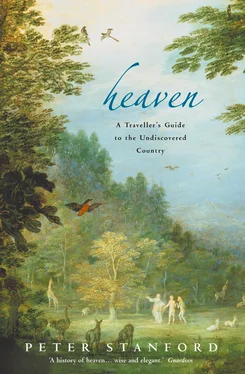The rise of Christian fundamentalism has added a new twist to the eternal three-way split. For many born-again Christians have embraced a concept known as rapture, which represents a new departure in thinking about heaven. It has grown out of a very particular reading of St Paul’s prediction that when God descends in judgement ‘those who have died in Christ will be the first to rise and then those of us who are still alive will be taken up in the clouds, together with them, to meet the Lord in the air’ (I Thess 4:14–17). This meeting will, the new breed of fundamentalists believe, be shortlived; a refuge in the time of trial predicted by Revelation before Christ instigates a millennium of direct rule on earth and the visitors to heaven return to take their rightful place at his side. The concept that heaven can be a temporary haven, almost a holiday destination, goes against every other Christian tenet. Yet it is disarmingly popular. A key exponent of rapture, the former Mississippi tug-boat captain turned Christian fundamentalist, Hal Lindsey, has seen his book, The Late Great Planet Earth , sell thirty-five million copies worldwide.
Such a reappraisal illustrates, in one sense, how flexible the idea of heaven (and indeed the New Testament) can be in the hands of believers. Something that can only live in the imagination is, by its very nature, almost impossible to control. Yet for many of us who have some kind of faith, it can be, for much of our lives, almost an irrelevancy. Until very recently, on the rare occasions that I plucked up the courage to look my post-mortem fate straight in the eye, my instinct had always been to postpone thinking about heaven. Focusing on the next world, it seemed to me, was a cop-out.
Heaven, I therefore know from experience, can very easily be left to one side as one of those tricky parts of the total religious package, accepted implicitly but without thought, something to think about on a rainy day. It largely depends on what stage of life you’re at. If the subject did come up in my teenage years at my Catholic school, it was as the flip side of hell, an altogether more worrying entity in those angst-ridden years. Heaven was certainly too much to contemplate in my fallen adolescent state. In my twenties, I lacked the romantic spirit of Keats who, at the age of twenty-five, when passion for life is at its peak (and also just a year before his death), wrote in Ode to a Nightingale :
Darkling I listen; and, for many a time
I have been half in love with easeful Death ,
Called him soft names in many a mused rhyme ,
To take into the air my quiet breath;
Now more than ever seems it rich to die ,
To cease upon the midnight with no pain.
But in my late thirties, the recent experience of losing one of my parents and then a much-loved mother-in-law has led me, if not to welcome death as a form of release like Keats, then to consider both it and heaven as never before. As I drove behind the hearse carrying my mother’s coffin to the church for her funeral, I thought of all the hundreds of times I had seen other sombre processions pass and scarcely paused in the business of living, let alone said a prayer. Belief, A. A. Gill once wrote, is like holding on to the end of a piece of string that disappears into the sky. Sometimes that string is yanked and it forces you to think.
Having had my string pulled, this book is, at least in part, my own traveller’s tale of searching for some sort of answer via a journey, real and imaginative, to the place where the Catholic Church of my upbringing tells me my mother has gone. The notion of a metaphorical or spiritual journey to heaven is a tried, tested and often fruitful one. In both the apocryphal writings of the first centuries AD and in the visionary ecstasies of the medieval age those who told of heaven spoke in terms of having travelled there. Most of the lasting accounts of paradise have effectively been travel books. It is in this spirit that I have included in this account of my own journey brief extracts from the tales told by contemporary travellers who have attempted to go one step beyond, and also, at various key moments in the history of heaven, excerpts from the travel journal I kept when I visited particular places which seemed to offer the possibility of a glimpse of the transcendent.
In the interests of completeness I have tried to keep an open mind and see beyond the more standard tenets of my Christian start in life. Most faiths have some sort of belief in another life but some schedule the route as a domestic departure – i.e. as all about transcending this life. This then remains a book written primarily for a Western audience with a Judeo-Christian heritage, but written in the knowledge that such a heritage cannot be understood or evaluated with looking carefully at the alternatives.
Such a broad scope has the advantage of carrying with it the potential to quell my own greatest anxiety at the start of this journey, namely that there may be nothing at its end, that I may be going nowhere (now or ever), and that heaven is religion’s biggest con-trick, its way of ensuring that churches, synagogues and mosques will remain full and flourishing. If I reach such a conclusion, I comfort myself now, at least I can then fall back on the Buddhist position of seeking enlightenment in this life by way of consolation.
A Gallup Poll in the early 1980s suggested that in the West, at least, the majority of voters still place their trust in heaven, even if its manifesto is no longer very precise. The 71 per cent who signed up for it were only one point down on the number in a similar survey in 1952. As long as there are men and women afraid of death and anxious to believe that it is not the end, there is a ready audience, happy to take the anaesthetic to life’s worries that heaven provides. But perhaps oblivion shouldn’t be an anxiety for any of us. Nothing may be better than the torment which the old-style Catholicism of the Penny Catechism promised in purgatory, limbo or, worst of all, hell. If you put your faith in heaven, then you had to be prepared for the dreadful consequences of not getting your grades.
Today, of course, it is arguably easier. There is no mention of hell from the pulpits of the mainstream churches. Purgatory and limbo have been put to grass, and the assumption in most religious circles is that we are all bound for some sort of heaven, even if that isn’t stated categorically too often. When set against the secular alternative, this pared-down, consumer-driven religion should be more enticing. Yet the pews are emptying at a ferocious rate in the developed world. Why isn’t heaven still working its magic?
Perhaps it has something to do with the fact that we live in an age when the whole thrust of contemporary attitudes is not to think about death. If it comes knocking at our door – if a close friend or relative dies – then we are encouraged to forget it as quickly as possible. The secular answer to the mystery of death is effectively to deny death an airing. We freely admit our inability even to contemplate the scale or the individual significance of the global deaths we cause and have the potential to cause with our nuclear weapons, our environmental destruction and our indifference to the north-south divide. And when we face death in our own backyard, as it were, amongst our family and friends, we sweep it under the carpet and instead grow ever more obsessed with our living bodies – new diets, health regimes and endless work-outs – in the hope that somehow we can arrest the march of time. Death has become a kind of failure – a failure to eat the right food, or exercise, or avoid the sun. Death has become each individual’s responsibility, not humanity’s destiny.
Читать дальше












